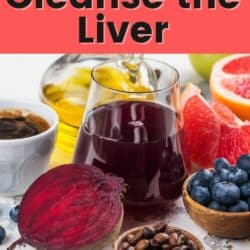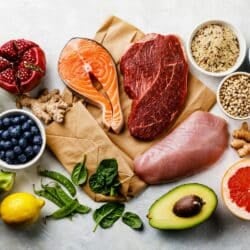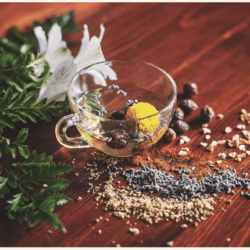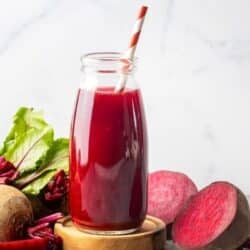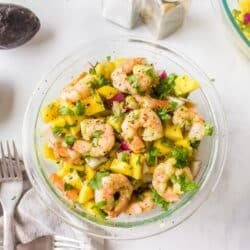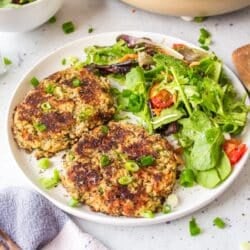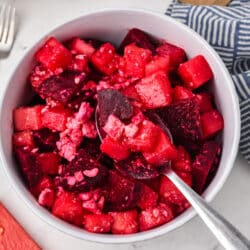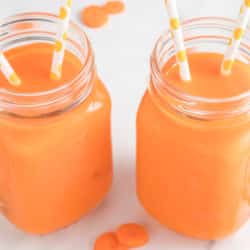13 Foods That Support the Liver Naturally
If you want to support your liver and its natural detoxification abilities, here is a list of foods that can help support the liver. These healthy foods are naturally cleansing and supportive of your best health.
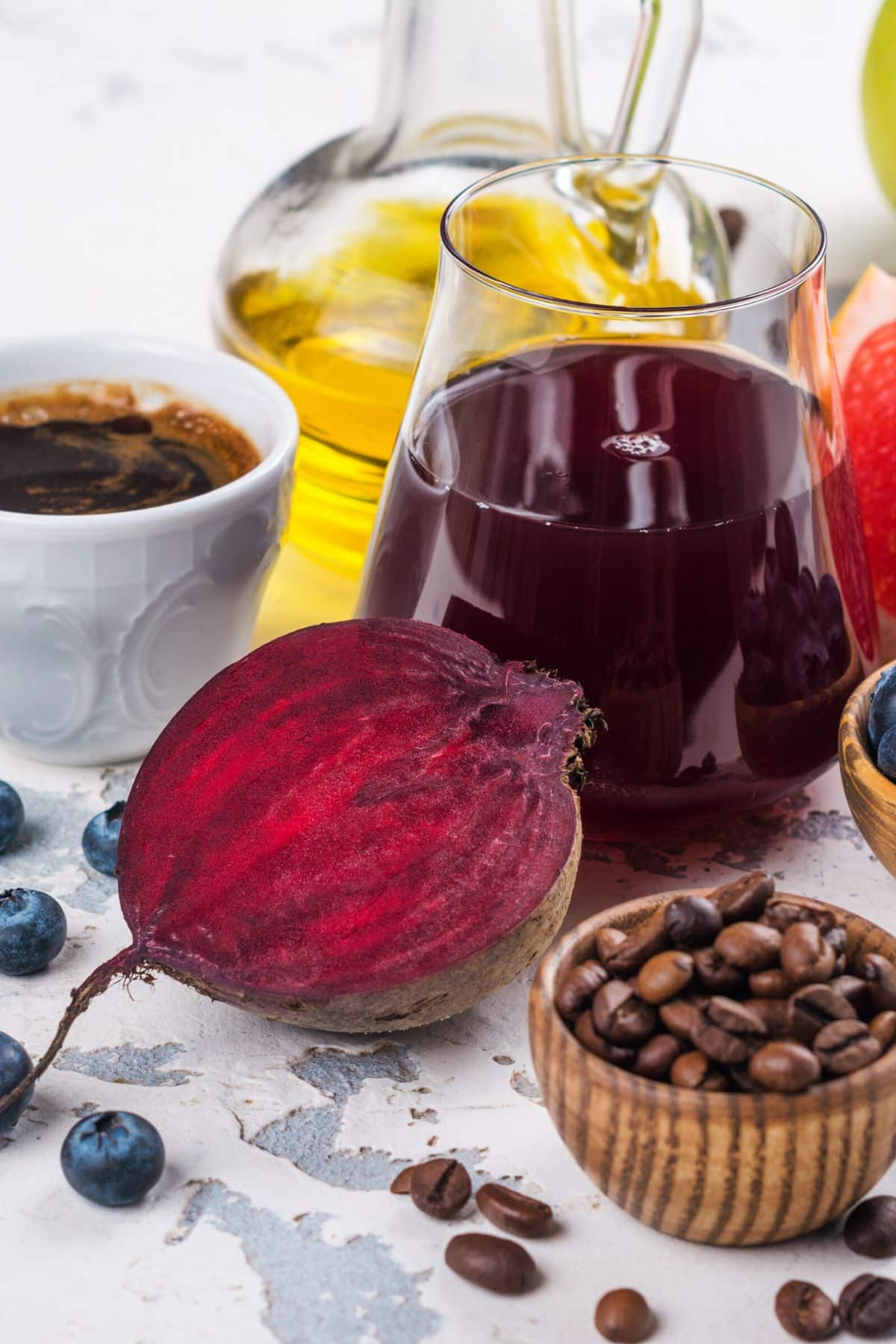
Foods to Support the Liver
The good news is that there are lots of natural foods and vegetables shown to be beneficial to your liver, helping ensure that it functions effectively.
Try to choose organic options wherever possible, as this will minimize your exposure to pesticides and avoid a build-up of toxins or toxic wastes.
1. Cruciferous vegetables

Cruciferous vegetables like broccoli, Brussels sprouts, cabbage, and cauliflower are high in fiber and packed with helpful plant compounds.
These include substances that can increase levels of detoxification enzymes, thereby supporting liver function.
Studies on animals have shown that cruciferous vegetables may also help prevent the development of fatty liver disease and liver tumors.
Crucifers can be cooked in all kinds of ways, from steaming and sauteeing to roasting and air-frying. Some – like watercress and arugula – can be enjoyed raw!
If cruciferous vegetables tend to make you feel bloated and gassy, try taking probiotic supplements to improve your digestion or eating more probiotic foods like yogurt. See my list of the foods with natural probiotics.
You can also try lightly steaming or sautéing your cruciferous veggies with some healthy fats to help your digestive system handle them better.
And, don’t miss these recipes including Broccoli Crunch Salad, How to Grow Broccoli Sprouts, and How to Grow Broccoli Microgreens.
2. Beets
Among their many benefits, beets are rich in natural pigments called betalains. These strong antioxidants in beet help regulate the body’s inflammatory response and support the repair of liver cells.
Studies on rats have demonstrated that beet juice can also help the liver cells remove toxins from the body more effectively. You can make your own beet juice using raw beets and add ingredients like apple or ginger if you find the taste too earthy.
Other ways to enjoy beets include steaming, boiling, and roasting them. Make sure you eat the greens, too – they are great sauteed with a little olive oil and garlic! This is a great way to get all the benefits from this healthy veggie.
Don’t miss my recipes for Beet Juice, or my articles on the Benefits of Beet Juice or How to Make Beet Juice Powder.
3. Citrus fruits

Citrus fruits like orange, lemon, mandarin, lime, and grapefruit contain a chemical compound in their peel called D-limonene.
This compound in citrus fruits may help reverse some of the damage to the liver caused by nonalcoholic fatty liver disease.
You can increase the amount of D-limonene you consume by adding the zest from citrus fruits to your recipes, or by drinking pulpy fruit juices.
Other helpful and powerful antioxidants for the liver are naringenin and naringin. And, of course, citrus fruits are high in vitamin C.
These may reduce inflammation and protect the liver cells from damage. Grapefruit is a particularly good source of these nutrients, so try drinking grapefruit juice or enjoying grapefruit slices in a salad.
4. Coffee
One of the best ways to support your liver’s health is to drink at least a cup of coffee every day.
Research shows that coffee may protect against a form of liver cancer and reduce the risk of cirrhosis in people with liver disease.
Experts think that this is because coffee helps prevent fat and collagen from accumulating.
In fact, researchers are so impressed by the usefulness of coffee in supporting the liver that they have referred to it as “the magical bean for liver diseases“.
See my articles on the Best Low Acid Coffee, the Healthiest Organic Coffee, and my recipe for Protein Coffee. And, if you can’t tolerate coffee because of the negative effect of caffeine, see my list of the Best Organic Decaf Coffee.
5. Garlic

Garlic is a rich source of antioxidants and has been shown to protect the liver from damage associated with alcoholic liver disease. The powerful antioxidants help reduce free radicals.
Other research has demonstrated that eating raw garlic 7 times per week can significantly cut the risk of developing fatty liver disease. However, this particular study only saw this benefit in men, not women.
Eating raw garlic at least twice a week may also offer protection against liver cancer.
Try mincing a clove of raw garlic and tossing it with your salad, adding it to your guacamole, or combining it with butter and spreading it on your toast.
It is impossible to totally disguise the smell, although chewing natural breath fresheners like parsley or mint can help.
6. Fatty fish
Fatty fish like salmon, sardines, and mackerel are great sources of omega-3 fatty acids.
Researchers have found that eating these fish maintains a healthy balance of fats in the liver, resulting in higher levels of “good” HDL cholesterol and lower levels of liver fat.
You can also derive fatty acids from plant-based sources such as flaxseeds and walnuts.
While increasing your consumption of omega-3 fats, you might want to consider the amount of omega-6 fats you consume.
Experts say that most Americans exceed the recommendations for omega-6 fats and that this may lead to the development of liver disease.
Processed seed and vegetable oils high in omega-6 include sunflower, soybean, corn, and cottonseed oils. In addition to avoiding the oils themselves, you should also cut down on the processed foods that contain them.
7. Leafy greens, especially dandelion root
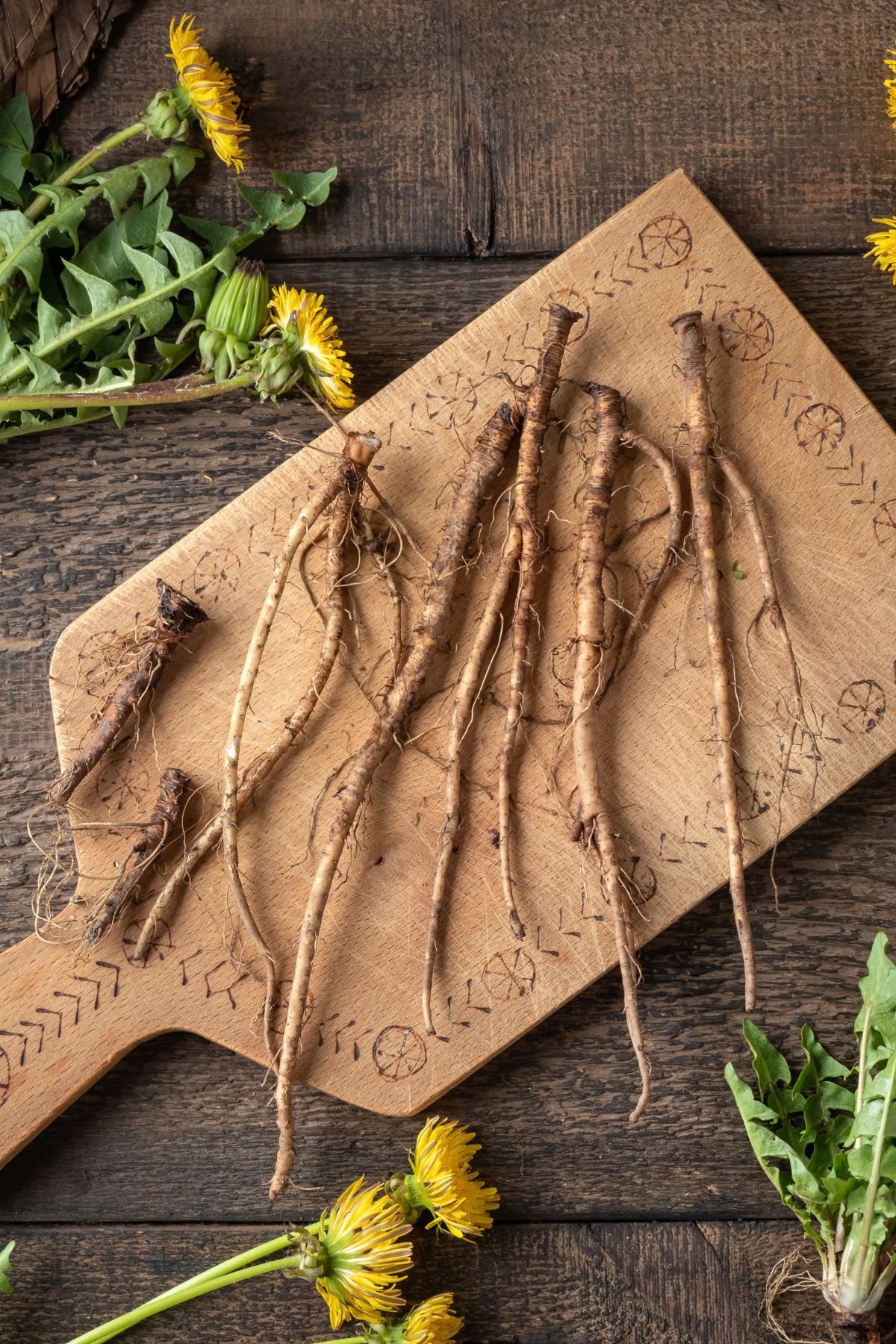
Leafy greens like arugula, spinach, and kale are all rich in plant chlorophylls. Chlorophyll is known to bind to toxins, so eating greens may help reduce your body’s toxic burden and support your liver.
Dandelion root and leaves are particularly helpful in ridding the body of toxins, so why not try some dandelion root tea too?
8. Olive oil
The benefits of olive oil for heart health have long been known and research has shown that it can be good for the liver too.
It may be helpful for those with non-alcoholic fatty liver disease and may lead to healthier levels of liver enzymes and less accumulation of liver fat. Separate research has shown that consuming olive oil can also reduce liver inflammation.
Use olive oil as a finishing oil on salads or to make your own dressings (try my Honey Mustard Dressing). You can also use it as a substitute for butter in many baked recipes.
9. Turmeric root

Turmeric has been used in Ayurvedic medicine for many years to treat a range of conditions. Studies have confirmed its benefits, one of which is that it can help prevent liver disease.
The bioavailability of turmeric is quite low, which means that we don’t absorb very much from eating it. For that reason, supplements are often recommended, with the dosage dependent on the brand.
This study showed that supplementation with turmeric extracts could be helpful for people with nonalcoholic fatty liver disease. The curcumin in turmeric can also help control inflammation, potentially protecting against chronic (long-term) liver injury.
Separate research shows that it can stimulate the production of bile in the liver, too.
Try my recipe for a Turmeric Shot using fresh or powdered turmeric.
10. Apples
Tests on animals suggest that the polyphenols (antioxidants) apples contain can help cut down on the amount of fat deposited in liver tissues.
The reduction in the amount of fat deposited can help guard against liver disease.
Although there is little medical evidence to support it, many people also like to consume apples because they contain malic acid. This is believed to help open ducts in the liver, allowing it to be “flushed” more easily.
11. Green tea

Packed with antioxidants, green tea is believed to offer a wide range of health benefits. So it’s good to know that drinking it can also support our liver!
At least one study showed that green tea can help prevent liver disease, although the best results were seen in those consuming more than 10 cups a day.
There is also evidence that green tea can help protect against liver cancer and cut down on the amount of fat deposited in liver cells.
Green tea may be an acquired taste but there are ways of making it more palatable if you don’t enjoy it.
Try adding lemon juice, or a natural sweetener like honey or stevia. You may also like to try your favorite spices – ginger, cardamom, and cinnamon all work well.
Or, try matcha which is similar to green tea. I love this Coconut Matcha Latte.
12. Walnuts
Not only are they a great source of fatty acids, but walnuts are also high in antioxidants and have proven to be helpful for those with non-alcoholic fatty liver disease.
This is because walnuts may reduce the amount of fat deposited in the tissues of the liver.
You can enjoy a handful of nuts as a healthy snack. Nuts are a big part of my diet and are listed in my articles on the Best No-Sugar Foods and my Clean Eating Shopping List.
13. Asparagus

Of all fruits and vegetables, asparagus is one of the very best sources of the antioxidant glutathione.
Research shows that glutathione is beneficial in the treatment of chronic fatty liver diseases, although it works best given in high doses intravenously, rather than via food.
Nevertheless, asparagus remains a good choice for supporting the liver, and its ability to break down toxins makes it a popular hangover remedy!
Asparagus cooks quickly and can be prepared in a variety of ways. Try sautéing it with a little olive oil for a liver-friendly side dish that’s ready in minutes.
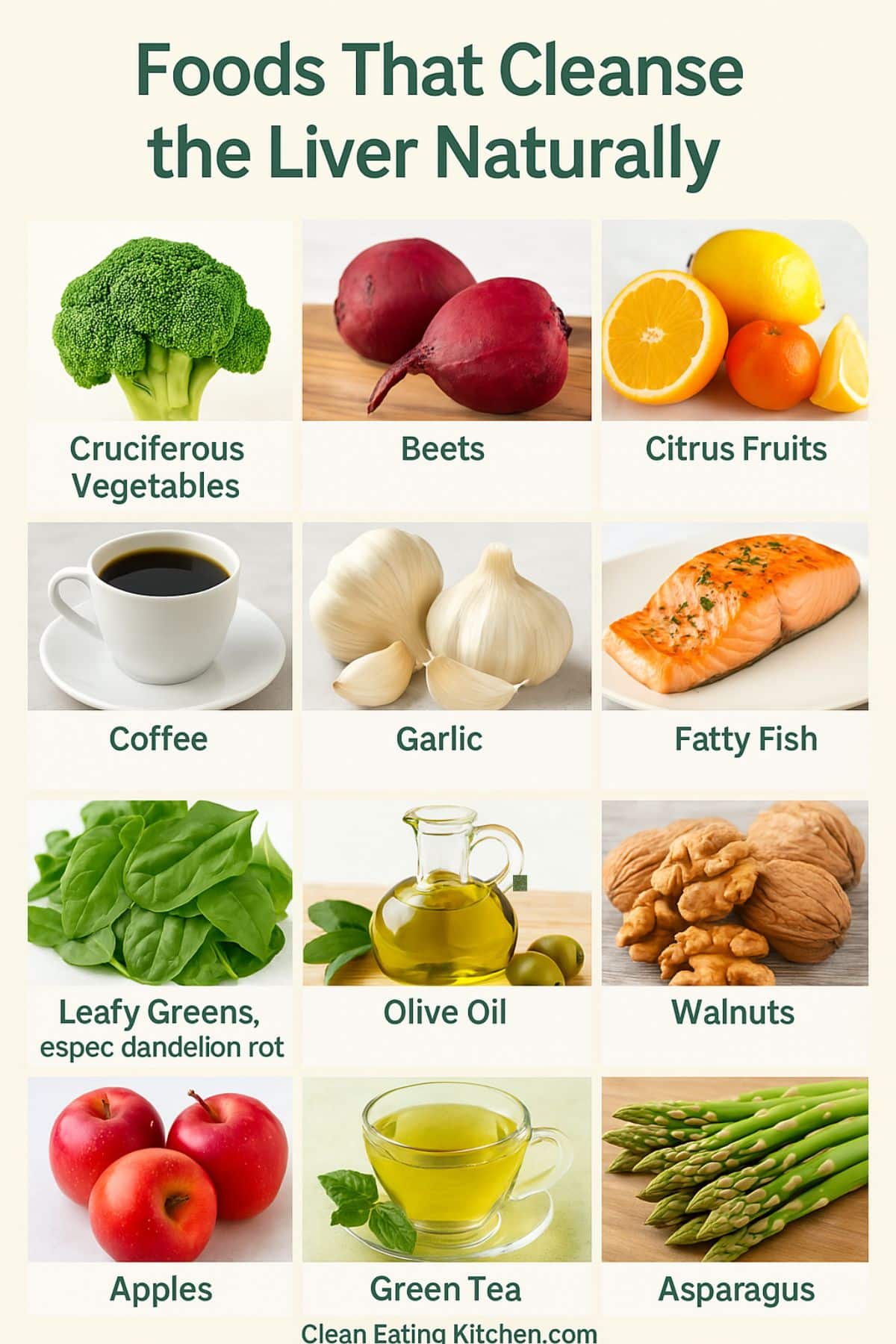
What Does The Liver Do?
The liver – located under the ribs on the right-hand side of your body – is your largest solid organ. Like your heart, it is also one of the most important.
All of the blood that leaves your stomach and intestines passes through your liver. Indeed, it holds around a pint of your blood supply at any time. The cells of your liver – known as hepatocytes – then remove harmful substances from your blood in a process known as detoxification.
These waste products are then carried away from the liver in a substance called bile and eventually excreted from your body.
The liver has many other important roles too.
It breaks down food and converts it into energy that your body can use. Carbohydrates are broken down into glucose and then stored in the liver and muscles as glycogen. If your body quickly needs a supply of energy, your liver will then rapidly convert that stored glycogen back into glucose.
Your liver also protects you from infections by calling on your macrophage system. This is a defense mechanism that destroys any bacteria it encounters. Nearly half of your body’s supply of macrophages is contained in your liver. These are known as Kupffer cells.
Other functions of the liver include:
- Regulating blood clotting
- Producing cholesterol and proteins to transport fats through the body
- Processing the hemoglobin (the protein in your red blood cells) and storing iron
- Clearing a yellowish pigment called bilirubin from your red blood cells (a build-up of bilirubin can lead to yellowing of the skin and eyes)
Does the Liver Need Cleansing?
The liver is designed to cleanse itself naturally. Sometimes, damage to the liver can prevent it from doing so. But this isn’t something that can be fixed by “cleansing”.
Liver damage requires medical treatment and possible changes to one’s diet and lifestyle.
The concept of cleansing the liver is more of a marketing ploy, designed by companies who want to sell products that – they say – help with detoxification. The idea that you can take something to help undo the damage caused by indulging in too much food or alcohol is tempting. But there is no scientific evidence to support it.
However, it is important to care for your liver consistently so that it can do its job properly. And, you can support your liver’s job of detoxification by choosing the foods listed in this article.
This means exercising regularly, limiting the amount of alcohol you consume, and enjoying a healthy diet. By focusing on nutritious whole foods (preferably organic) and drinking plenty of water, you can reduce the number of toxins that your liver has to cope with. You will also provide the nourishment it needs to function effectively.
The healthier you are overall, the more likely you will have a healthy liver and immune system.
Signs of a Sluggish Liver
When toxins remain in our systems for longer than they should, our metabolism can be affected.
People who may have sluggish liver function tend to experience a range of symptoms as a result, which may include:
- Bloating and gas
- Acid reflux or heartburn
- Difficulty in losing weight
- Mood swings
- Fatigue
- Craving sugar
- Irregular bowel movements
- Poor appetite
- Bruising
- Itchy or blotchy skin
- Feelings of stress or anxiety
- Bad breath
You should always speak to a medical professional if you are concerned that your symptoms may be related to your liver. You may need to take a blood test to check the blood markers of liver health.
Liver Supportive Recipes You Might Like
- Salmon Stir Fry
- Instant Pot Beets
- Instant Pot Asparagus
- Roasted Brussels Sprouts and Sweet Potatoes
- Turmeric Shot
- Liver Cleanse Juice
- Liver Detox Green Smoothie
Don’t Miss These Health Articles
Conclusions
Your liver is an incredibly vital organ. It removes toxins from your body, cleanses your blood, and converts the foods you eat into forms that you can use for energy. The foods listed here will help support it with all these important functions, keeping you feeling healthy and energized throughout the day.
Don’t forget to join my newsletter list to get exclusive clean eating recipes and tips. The newsletter is 100% free with no spam; unsubscribe anytime.
About the Author: Carrie Forrest has a master’s degree in public health with a specialty in nutrition and is a certified holistic nutritionist. She is a top wellness and food blogger with over 5 million annual visitors to her site. Carrie has an incredible story of recovery from chronic illness and is passionate about helping other women transform their health. Send her a message through her contact form.
Note: this post is for informational purposes only and is not intended as medical advice. Please consult your healthcare provider for recommendations related to your individual situation.


